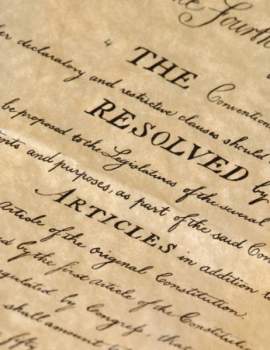
An Easy Guide to the Bill of Rights for Kids

Popular In Constitution
Purpose Of Lifetime Appointment And Pros And Cons Enumerated Powers Bicameral Legislature Background Article 3 Of The Constitution We The People 1st Amendment Who Wrote The Constitution Judicial Review Equal Protection Clause 5th Amendment 10th Amendment Three Fifths Compromise
The Bill of Rights, or first ten Amendments of the Constitution, are the undeniable rights awarded to American citizens. Published over 200 years ago, these rights still hold incredible significance as it pertains to present day society.
When they were first introduced, the Bill of Rights only extended to matters overseen by the Federal Government. Trials or instances where the rights were in question did not associate with State governments until the early 1890s. Using the 14th Amendment as its platform, the United States extended the reach of the Bill of Rights to State governments through the incorporation doctrine.
The 14th Amendment of the United States Constitution provided American citizens
with a broad definition of their undeniable rights. The Due Process Clause,
perhaps the Amendment's most important subsection, recognizes a series of
substantive due process rights including: parental, marriage, and procedural
rights. The Due Process Clause enabled State governments to recognize the
liberties offered in the Bill of Rights to individuals. It simply forced the Government
to respect all legal rights established in the Constitution.
Prior to adoption and subsequent ratification of the 14th Amendment, the
Supreme Court consistently held that the Bill of Rights applied specifically to
the Federal Government. Inclusion into State law arose in the early 1890s when
a series of Supreme Court questioned the credibility of the first 10 Amendments
on a State level.
The two most notable Supreme Court cases which sparked the genesis of the
incorporation doctrine were Chicago, Burlington and Quincy
Railroad v. City of Chicago (1897) and Gitlow vs. New York (1925). In each of these
cases, the Supreme Court ruled that the individual State governments were bound
to uphold the particular civil liberties awarded in the Constitution.
In the Quincy Railroad case
the Supreme Court ruled that some form of just compensation is required for
property appropriated by State or local governments. This particular ruling
upheld and extended the rights detailed in the 5th Amendment to Quincy as they
pertained to State governments.
The 1925 Supreme Court case of Gitlow vs New York
is perhaps the most notable inclusion of the Bill of Rights into State law.
Benjamin Gitlow was an American socialist who was convicted of criminal anarchy
for his role in the production of a Communist publication-"The Left Wing
Manifesto." The courts claimed that Gitlow was attempting to augment a
violent overthrow of the Government through his publication and teachings.
Although the New York court found him guilty, the Supreme Court upheld Gitlow's
rights to free speech and free press and later freed him of charges. The Court stated
in its decision, "for present purposes, we may assume that freedom of
speech and of press...are among the fundamental personal rights and liberties
protected by the due process clause of the Fourteenth Amendment from impairment
by the State." The Supreme Court's ruling was a fundamental starting point
for the Bill of Rights to be observed and respected by State law.
Rulings such as Burlington and Quincy Railroad v. City of
Chicago (1897), and Gitlow vs. New York (1925)
have cemented the inclusion of the Bill of Rights into State law. However,
there are a few Amendments, due to their broadness, ambiguity, or archaic
nature, which have not been incorporated into State governments. Below is a
listing of the Amendments found in the Bill of Rights and their status in
regards to State law.
1st Amendment-
● Establishment of religion-incorporated
● Free exercise of religion-incorporated
● Freedom of speech-incorporated
● Freedom of the press-incorporated
● Freedom of assembly-incorporated
2nd Amendment-The right to bear arms is not incorporated against the states.
3rd Amendment-Freedom of quartering soldiers is not incorporated against the states.
4th Amendment
● Protection against unreasonable search and seizure-incorporated
● Various requirements for warrants-incorporated
● Judgments pertaining to unreasonable acquisitions of warrants-incorporated
5th Amendment-
● Right to indictment by a grand jury has not been incorporated-the majority of state constitutions have previously upheld this right.
● Protection against double jeopardy-incorporated
● Protection against self-incrimination-incorporated
6th Amendment-
● Right to a speedy trial-incorporated
● Right to a public trial-incorporated
● Right to trial by impartial jury-incorporated
● Right to notice of accusations-incorporated
● Right to confront adverse witnesses-incorporated
● Right to assistance of counsel-incorporated
7th Amendment-The right to a jury trial in civil cases
is not incorporated against the states.
8th Amendment-
● Protections against "excessive" bail or "excessive" fines have not been incorporated against the states.
● Protection against cruel and unusual punishment-incorporated
9th Amendment-Rights of the people that are not
specifically detailed in the Constitution are not incorporated against
the states.
10th Amendment-Powers not granted to the national Government
and reserved to the states and the people-incorporated.
NEXT: Bill Of Rights Overview





















